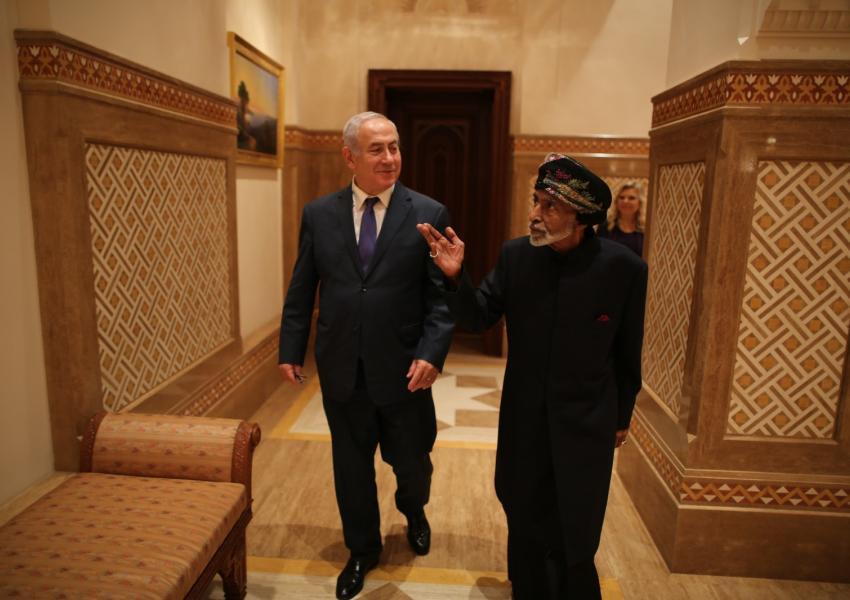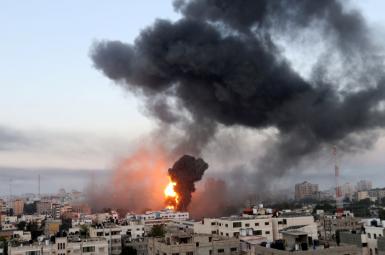
Opposing Paradigms in Foreign Policy: Expansion of Influence vs Normalization of Relations
Benjamin Netanyahu’s trip to Oman in October 2018 was not good news to many Shia and Sunni Islamists. This is despite the fact that the Sultan of Oman has already allowed Omani banks to give a hand to Iranians under sanctions. Netanyahu’s future trips to Bahrain and probably Sudan will make them even more isolated and displeased.
How has Israel done so far, both politically and economically, to open up its relations with these countries? On the other side, what has the Islamic Republic of Iran done in the last decade that Arab states are exceedingly distancing themselves from Iran? What means have been used by Iran to expand its influence in Iraq and Yemen? Syria and Lebanese Hezbollah have been beneficiaries of the Iranian regime for more than three decades and the regime has done everything possible to save them: Syria’s role has been to send weapons to Hezbollah and Hezbollah has been the player in charge of the assassination of the dissidents and threatening the existence of Israel.
The Precedents of Expansionism in the Middle East
The first regime in the modern Middle East that tried to put forward an expansionist agenda was Nasser’s in Egypt. His project, which was called the Arab Republic, was forgotten altogether during Anwar Sadat’s time in power. After that, it was Saddam Hussein who attacked Iran and then Kuwait to fulfill such a dream. He faced Western sanctions and then the American invasion, and finally was arrested as he had been hiding in a hole.
The Islamic Republic of Iran has gone for expansionism from the first days of its establishment under slogans such as “exporting the revolution” and “supporting the liberating movements”. After the war with Iraq in the 1980s, they pursued this ambition at a slower pace but more investments. The fall of Saddam Hussein in Iraq boosted Iranians’ aspirations. The Islamic Republic, unlike Iraq, never attacked another country, but has always waited on a conflict or a vacuum of power in the region, and then they would seize the opportunity to expand their area of military influence.
On the other side, Iran’s rivals in the region, Saudi Arabia and Turkey, never had expansionist ambitions. Israel has always wanted to defend itself and none of the frequent conflicts involving Israel started with their beginning the war. What Israel is doing now is containing the Islamic Republic’s wave of interfering: to harness a force that only wants to destroy Israel.
The Israeli Way: Normalization through R&D
The Islamic Republic’s propaganda and other anti-Semitic groups in the region try to reflect Israel as a country whose defensive infrastructures cannot stand for even a few hours in the absence of the American unreserved protection. Contrary to this image, Israel is a developed and advanced country. If other states in the region do not close doors for any relations, Israel has technical capabilities and military technologies to offer. For example, before Netanyahu’s trip to Oman, it was the Israeli firms which had gone to this country to conduct research on desalination of water technology and other trades. Israel can stand comparison with other Western countries in pharmaceuticals, IT technology and drone manufacturing, so it will motivate some countries in the region to prioritize the economics of the relationship over the politics. Moreover, not to mention that Israel does not send its army to other points of the region, does not deploy mercenaries and does not fund proxy militias to expand its territory of influence. To protect its country, Israel tries to normalize its relations with other Middle Eastern nations through initiating meaningful cooperation with research and development.
The Iranian Way: Expansion through Mercenaries, Missiles, and Cash
The leaders of the Islamic Republic are waiting on any political conflict and chaos in the region to enter these areas of turmoil by sending (a) dirty money coming from smuggling (based on reports 15 to 25 billion dollars, mostly by the IRGC through its unofficial ports), (b) Afghan, Pakistani, Iraqi, and Lebanese mercenaries, (c) guns and missiles made originally by China and North Korea with minor alterations in Iran to make them Iranian artillery. They do not consider that crises are short-term and will not sustain for a long time. Long-term relations, on the other hand, need developments and progress, and no mercenaries or missiles.
Alliances
The Islamic Republic of Iran has created a regional alliance called “the resistance axis” where two states, Iran and Syria, collected a number of militia groups including Hezbollah, Houthis, Popular Mobilization Forces, Hamas, Islamic Jihad, and the oppositions of Bahrain and Saudis. The military nature of this coalition has led the other sides to create their own alliances which include cooperation between Israel, Arab states of the Persian Gulf and North Africa and Jordan. Part of the Lebanese government works with this alliance too. Part of the Iraqi state tries to be independent of either of these alliances.
The first alliance is based purely on Iranian oil money and Shia sectarianism, while the other alliance has more financial resources, greater geographical footing, more advanced technologies, more active diplomacy, and stronger armies.
The Fruits of Iran’s Interference
The Islamic Republic of Iran’s paradigm to expand its territorial influence has resulted in nothing except calamity, massacre, instability for peoples of Yemen, Iraq, Syria, Lebanon, and Palestine. Take a look at the areas where the Islamic Republic has sent or backed its militias in the last forty years: No sign of any human development whatsoever. The Islamic Republic of Iran is the greatest impediment to peace and security in the Middle East.
The Iranian regime is now harvesting some of the fruits of its military interventions in other countries: the reestablishment of relations between Israel on one side and Bahrain, Sudan, and Oman on the other and also the alliance of north and west African states against Iran. Sudan, for example, was one the areas of Iran’s influence up until a few years back. With Trump’s policies, the time that such acts of interference remain without costs for the Iranian regime is over. Thus, many countries which thought before they were similar to Iran (like Sudan in the violation of human rights) have realized they cannot remain on Iran’s front anymore.
After the assaults on Saudi’s embassies in Iran, Saudi Arabia showed successful diplomacy in convincing other Muslim majority countries to distance themselves from Iran. Sudan, Morocco, Bahrain, Yemen, and Djibouti cut their ties with Iran as a consequence.
Taking Advantage of the Instability
The Islamic Republic of Iran has acted in so destructive ways that it does not have any permanent allies even among its neighbors. Its anti-American, anti-Israel approach was its main drive to make friends with regimes who share the same hatred around the world. The status of the regime’s approach is at its historical low. The same people, who accused Israel of being expansionist, aspire to expand their territory of influence from the Red Sea to the Western Mediterranean. They even talk about conquering the American continent too (See two IRGC generals’ claims in this regard here and here).









